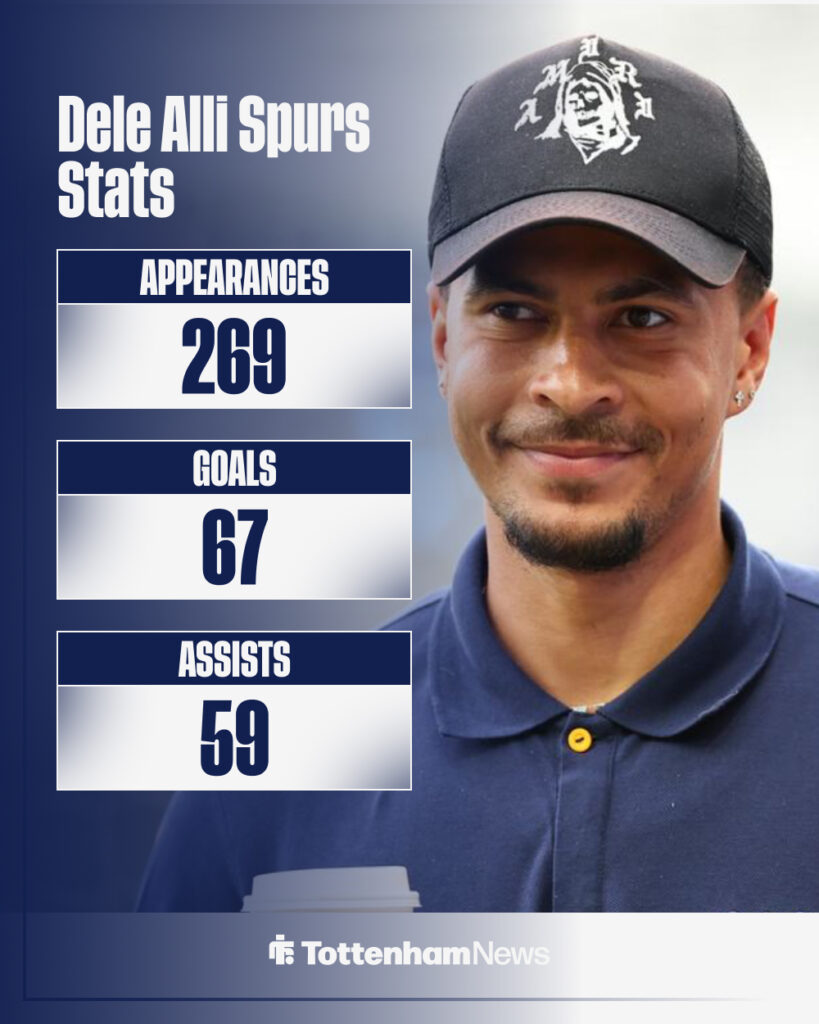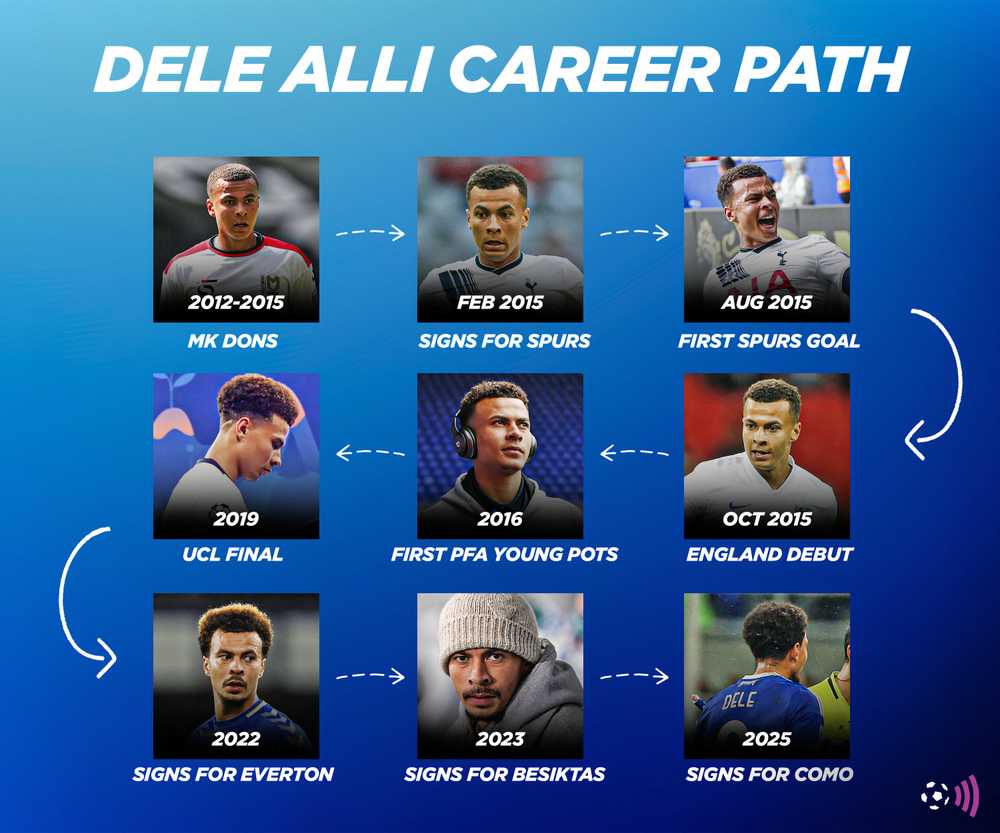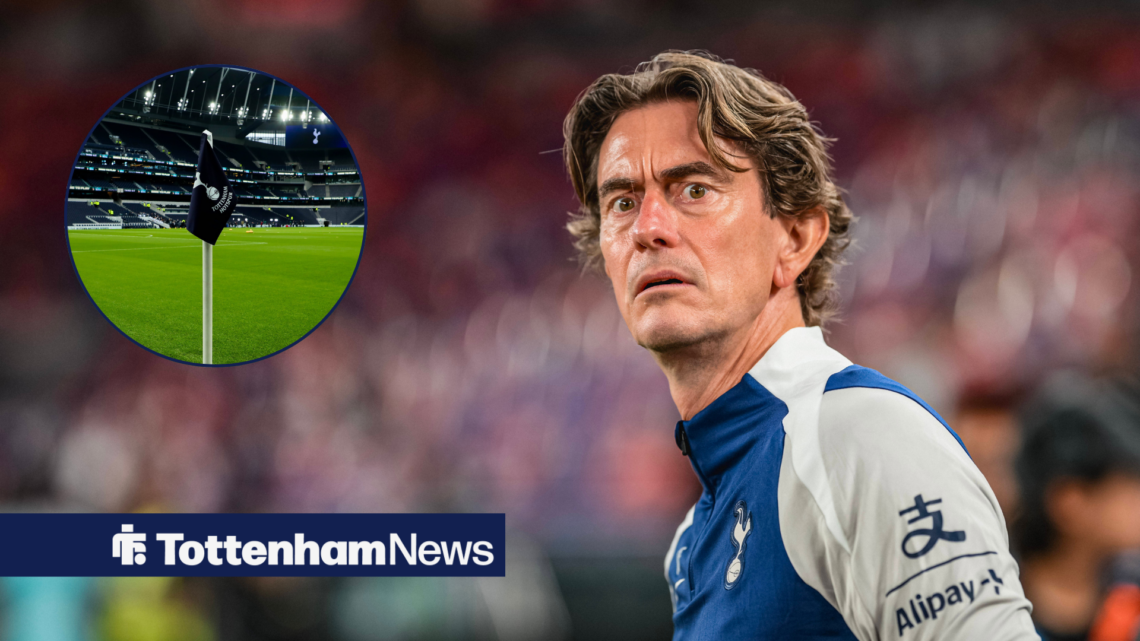Tottenham Hotspur once had a player who could have defined an era for them a player of extraordinary talent whose potential under Thomas Frank could have reached unimaginable heights.
When Tottenham replaced Ange Postecoglou with the Danish tactician, few predicted such an impressive start. Frank has brought composure, tactical discipline, and attacking sharpness to a side once seen as unstable.
Yet, one can’t help but wonder how much more dangerous Spurs could have been had they kept one of their brightest stars Dele Alli.
Dele Alli’s time at Tottenham began like a dream. Signed from MK Dons in February 2015 for around £5 million, he quickly became one of the most exciting midfielders in Europe.
After finishing his loan at MK Dons, Alli exploded onto the Premier League scene. In his early years, his combination of flair, intelligence, and timing made him almost unplayable.
His second season at Spurs, 2016/17, remains unforgettable scoring 22 goals in all competitions and recording 126 goal contributions overall during his time in north London. For a midfielder barely in his twenties, those numbers were remarkable.
Former Tottenham midfielder Darren Anderton once described Alli as a “freak of a talent,” comparing him to the likes of Steven Gerrard and Paul Scholes.

At his peak, Alli was expected to lead Spurs alongside Harry Kane and Son Heung-min. Everything pointed to a player destined for greatness yet, in the blink of an eye, his story changed.
By January 2022, he signed for Everton, marking one of football’s most puzzling declines for a player once seen as a generational star.
What went wrong for Dele Alli is a painful mix of circumstances, personality clashes, and managerial missteps. The turning point came in 2019 when Mauricio Pochettino, the man who understood Alli best, left Tottenham.
Under Jose Mourinho, Alli’s struggles deepened. Their infamous exchange in the “All or Nothing: Tottenham Hotspur” documentary became symbolic of his decline.
Mourinho tried to warn him that he would one day regret his lack of consistency, but instead of motivation, it became friction.
Then came Antonio Conte, another demanding manager. With his strict discipline and high expectations, one might have thought Conte could reignite Alli’s spark.

Instead, their relationship followed a similar pattern distance and misunderstanding. Both Mourinho and Conte had managed big personalities like Cristiano Ronaldo and Romelu Lukaku, but Dele needed something different.
He required empathy, not aggression; reassurance, not pressure. Instead of building him up, those environments pushed him further away from his true self.
That’s where Thomas Frank could have made all the difference. Frank’s reputation at Brentford was built not only on tactical intelligence but on his ability to understand and nurture his players.
He guided individuals like Ivan Toney through personal and professional challenges, blending empathy with authority. He isn’t a manager who rules with fear; he builds relationships through trust. Under his watch, a player like Alli brimming with talent but emotionally fragile could have thrived again.
Frank’s Tottenham are already defensively solid, conceding just 0.7 goals per game according to Sofascore. However, they are still developing their attacking rhythm. The stats speak for themselves:
| Premier League | Statistic |
|---|---|
| Goals | 1.9 per 90 |
| Big chances | 1.4 per 90 |
| Total shots | 11 per 90 |
| Counter-attacks | 6 per 90 |
| Ball possession | 55.6% |
| Successful dribbles | 10.6% |
| Accurate crosses | 21.5% |
With 13 goals in their first seven league games, Spurs are effective but not explosive. The creative burden has largely fallen on Mohammed Kudus, who averages 1.9 key passes per game.
Yet, Tottenham lacks a consistent creator someone to turn tight games into decisive wins. That’s exactly where Dele Alli could have been invaluable. His ability to find pockets of space, link play, and score from midfield is something Spurs still miss.
Under Thomas Frank’s system, Alli’s natural instincts could have flourished again. He was never a traditional midfielder; his timing, movement, and confidence made him a unique threat.
In a team where structure meets freedom, Alli would have had the platform to rediscover his spark. He thrived when he felt understood and trusted, and Frank’s leadership style aligns perfectly with that need.
This situation feels like a story of two people who could have helped each other a coach who values emotional intelligence and a player who lost his confidence through mismanagement.
Frank could have guided Alli with the care and respect he lacked in his later Tottenham years, while Alli could have provided Frank’s Spurs with the creativity and unpredictability they currently miss.
It’s rare in football that a player and a manager seem so naturally suited for each other without ever working together. In another timeline, perhaps Dele Alli would be thriving once again under Frank’s guidance smiling, scoring, and inspiring fans just like he used to.
But instead, his chapter at Tottenham remains one of both brilliance and heartbreak a reminder of what could have been if the right man had arrived at the right time.
Sometimes, talent alone isn’t enough. It needs nurturing, patience, and belief. Under Thomas Frank, Dele Alli could have had all three — and Tottenham might have found their missing piece once again.
